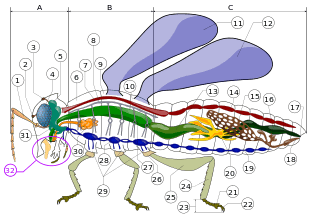Definify.com
Webster 1913 Edition
Insect
In′sect
(ĭn′sĕkt)
, Noun.
[F.
insecte
, L. insectum
, fr. insectus
, p. p. of insecare
to cut in. See Section
. The name was originally given to certain small animals, whose bodies appear cut in
, or almost divided. Cf. Entomology
.] 1.
(Zool.)
One of the
Insecta
; esp., one of the Hexapoda. See Insecta
. ☞ The hexapod insects pass through three stages during their growth, viz., the larva, pupa, and imago or adult, but in some of the orders the larva differs little from the imago, except in lacking wings, and the active pupa is very much like the larva, except in having rudiments of wings. In the higher orders, the larva is usually a grub, maggot, or caterpillar, totally unlike the adult, while the pupa is very different from both larva and imago and is inactive, taking no food.
2.
(Zool.)
Any air-breathing arthropod, as a spider or scorpion.
3.
(Zool.)
Any small crustacean. In a wider sense, the word is often loosely applied to various small invertebrates.
4.
Fig.: Any small, trivial, or contemptible person or thing.
Thomson.
Insect powder
,a powder used for the extermination of insects; esp., the powdered flowers of certain species of
Pyrethrum
, a genus now merged in Chrysanthemum
. Called also Persian powder
.In′sect
,Adj.
1.
Of or pertaining to an insect or insects.
2.
Like an insect; small; mean; ephemeral.
Webster 1828 Edition
Insect
IN'SECT
,Noun.
1.
In zoology, a small invertebral animal, breathing by lateral spiracles, and furnished with articulated extremities and movable antennae. Most insects pass through three states or metamorphoses, the larva, the chrysalis,and the perfect insect. The class of insects, in the Linnean system, is divided into seven orders, the last of which [Aptera] includes the Crustacea, which breathe by gills, and the Arachnids, which have no antennae, now forming two distinct classes.
The term insect has been applied,but improperly, to other small invertebral animals of the Linnean class Vermes.
2.
Any thing small or contemptible.IN'SECT
,Adj.
Definition 2026
insect
insect
English
| Picture dictionary | ||||||||||
|---|---|---|---|---|---|---|---|---|---|---|
| ||||||||||
|
Noun
insect (plural insects)
- An arthropod in the class Insecta, characterized by six legs, up to four wings, and a chitinous exoskeleton.
- 2013 May-June, William E. Conner, “An Acoustic Arms Race”, in American Scientist, volume 101, number 3, page 206-7:
- Nonetheless, some insect prey take advantage of clutter by hiding in it. Earless ghost swift moths become “invisible” to echolocating bats by forming mating clusters close (less than half a meter) above vegetation and effectively blending into the clutter of echoes that the bat receives from the leaves and stems around them.
- Our shed has several insect infestions, including ants, yellowjackets, and wasps.
-
- (colloquial) Any small arthropod similar to an insect including spiders, centipedes, millipedes, etc
- The swamp is swarming with every sort of insect.
- A contemptible or powerless person.
- The manager’s assistant was the worst sort of insect.
Synonyms
- bug (Colloquial 1,2)
Related terms
Translations
arthropod of class insecta
|
|
colloquial: any small arthropod
contemptible or powerless person








